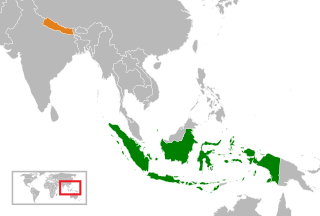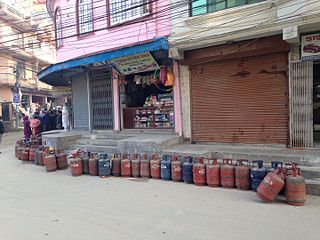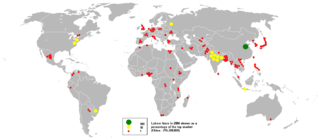
Though the Ministry of Foreign Affairs (MOFA) is the government agency which is responsible for conducting the foreign relations of Nepal, historically, it is the Office of Prime Minister (PMO) which has exercised the authority to formulate the country's foreign policies. As a landlocked country wedged between two larger and far stronger powers, Nepal has tried to maintain good relations with both of its neighbors, People's Republic of China and Republic of India. However, the relationship between Nepal and India was significantly hampered by the 2015 Nepal blockade when the Government of Nepal accused India of mimicking "Russia-Ukraine" tactics by using ethnically Indian residents of Nepal to cause unrest along Nepal's southern border. India denied the allegation and said the unrest were an internal affair. For the most part though, Nepal has traditionally maintained a non-aligned policy and enjoys friendly relations with its neighboring countries and almost all the major countries of the world.

Nepali are the citizens of Nepal under the provisions of Nepali nationality law. The term Nepali usually refers to the nationality, that is, to people with citizenship of Nepal, while the people without Nepales citizenship but with roots in Nepal such as Nepali Americans are strictly referred to as Nepali Speaking Foreigners who are speakers of Nepali, Maithili or any of the other 128 Nepali languages but are now foreign citizens or of foreign nationality bearing passports and citizenship of the foreign nation. It is also not generally used to refer to non-citizen residents, dual citizens, and expatriates.

Israel–Nepal relations refer to the bilateral ties between the State of Israel and Nepal. The two countries established diplomatic relations on 1 June 1960, making Nepal the third country in South Asia to recognize Israel behind Ceylon and India, and the first South Asian state to establish full bilateral ties with it.
Child Workers in Nepal (CWIN) is a non-governmental organization working as an advocate for children's rights. CWIN supports street children, children subjected to child labour, children who are sexually exploited, and also those victimized by violence. The organization's objective is to protect the rights of children in Nepal. It was established in 1987 by a group of students at Tribhuvan University who, upon investigating the conditions of children living on the streets in Kathmandu, Nepal, recognized the need for advocacy in this area. As a "watchdog" in the field of child rights in Nepal, CWIN acts as a voice for the disadvantaged and exploited children. It does this by lobbying, campaigning, and pressuring the government to protect and promote children's rights, and to end exploitation, abuse and discrimination against children.
The Bangladeshi Malaysians consists of people of full or partial Bangladeshi descent who were born in or immigrated to Malaysia. Bangladeshis in Malaysia form a large proportion of Malaysia's foreign labour force. Their population was estimated to total 221,000 persons, roughly one-eighth of all the foreign workers in Malaysia as of 2017. In early 2016, a controversial agreement by Bangladeshi Prime Minister Sheikh Hasina was signed to send a total of 1.5 million Bangladeshi workers in stages for 3 years to Malaysia. This decision was met with criticism from both individuals in government and the general Malaysian public and was quickly revoked.

Malaysia has a high commission in Dhaka and Bangladesh has a high commission in Kuala Lumpur. Both nations are members of the Commonwealth of Nations, the Organisation of Islamic Cooperation, the Developing 8 Countries and the Non-Aligned Movement. Malaysia was one of the first countries to recognise the independence of Bangladesh in 1971.

Pakistanis in Malaysia form the largest Pakistani diaspora community in southeast Asia and they also make up the 6th largest group of foreign workers/nationals in Malaysia as of 30 June 2017 according to the Malaysia's home ministry.
Human trafficking in India, although illegal under Indian law, remains a significant problem. People are frequently illegally trafficked through India for the purposes of commercial sexual exploitation and forced/bonded labour. Although no reliable study of forced and bonded labour has been completed, NGOs estimate this problem affects 20 to 65 million Indians. Men, women and children are trafficked in India for diverse reasons. Women and girls are trafficked within the country for the purposes of commercial sexual exploitation and forced marriage, especially in those areas where the sex ratio is highly skewed in favour of men. Men and boys are trafficked for the purposes of labour, and may be sexually exploited by traffickers to serve as gigolos, massage experts, escorts, etc. A significant portion of children are subjected to forced labour as factory workers, domestic servants, beggars, and agriculture workers, and have been used as armed combatants by some terrorist and insurgent groups.
Human trafficking in Nepal is a growing criminal industry affecting multiple other countries beyond Nepal, primarily across Asia and the Middle East. Nepal is mainly a source country for men, women and children subjected to the forced labor and sex trafficking. U.S. State Department's Office to Monitor and Combat Trafficking in Persons placed the country in "Tier 2" in 2017.
Malaysia is a destination and a source and transit country for women and children subjected to trafficking in persons, specifically conditions of forced prostitution and for men, women, and children who are in conditions of forced labour.
Nepalis in Qatar are migrants from Nepal to Qatar, mostly migrant workers and permanent residents, as well as their locally born descendants. As of May 2017, 400 thousand Nepali Citizens lived in Qatar as migrant workers, Nepal is the second largest expatriate community in Qatar. While there are Nepalese working in the business and administrative sectors of Qatar, most workers from Nepal fall under the umbrella of unskilled labor, and hold jobs in sectors such as construction and landscaping. Many workers from Nepal are hired to work on the construction of stadiums and railways that are being designed for the 2022 FIFA World Cup to be held in Qatar. According to Time Magazine, due to the terrible working conditions in Qatar, a Nepali worker dies every other day.
Nepalis in Saudi Arabia are immigrants from Nepal to the Kingdom of Saudi Arabia, mostly migrant workers and expatriates. Saudi Arabia has emerged as one of the top destinations for migrant Nepalese laborers. Approximately 215,000 Nepalese laborers, skilled and semi-skilled, work in the country. Most of them belong to the Madhesi race totalling up to 199,757, and the remainder predominantly belong to the Bahun and Chhetri ethnicities.

Indonesia and Nepal established diplomatic relations in 1960. Neither country has a resident ambassador. Indonesia only establishes honorary consulate in Kathmandu, while its embassy in Dhaka, Bangladesh, is also accredited to Nepal. Nepal, on the other hand, accredited its embassy in Kuala Lumpur, Malaysia, also to Indonesia. Both nations are also partners and founding members of the Non-Aligned Movement (NAM).

Cambodia–Malaysia relations are foreign relations between Cambodia and Malaysia. Both countries are members of ASEAN. Cambodia has an embassy in Kuala Lumpur, and Malaysia has an embassy in Phnom Penh.

Egypt–Malaysia relations are foreign relations between Egypt and Malaysia. Egypt has an embassy in Kuala Lumpur, and Malaysia has an embassy in Cairo.

Malaysia–Nepal relations refers to bilateral foreign relations between Malaysia and Nepal. Malaysia has an embassy in Kathmandu, and Nepal has an embassy in Kuala Lumpur.

The 2015 Nepal blockade, which began on 23 September 2015 and lasted about six months, was an economic and humanitarian crisis that severely affected Nepal and its economy.

The Embassy of the Republic of Indonesia in Kuala Lumpur is the diplomatic mission of Indonesia in Malaysia. The embassy serves large amounts of Indonesian migrant workers in Malaysia. Other Indonesian diplomatic establishments in Malaysia include four consulate-generals in Johor Bahru, Kota Kinabalu (Sabah), Kuching (Serawak), and Penang, and a consulate in Tawau.

Nepal has a labour force of 16.8-million-workers, the 37th largest in the world as of 2017. Although agriculture makes up only about 28 per cent of Nepal's GDP, it employs more than two-thirds of the workforce. Millions of men work as unskilled labourers in foreign countries, leaving the household, agriculture, and raising of children to women alone. Most of the working-age women are employed in agricultural sector, contributions to which are usually ignored or undervalued in official statistics. Few women who are employed in the formal sectors face discrimination and significant wage gap. Almost half of all children are economically active, half of which are child labourers. Millions of people, men, women and children of both sexes, are employed as bonded labourers, in slavery-like conditions. Trade unions have played a significant role in earning better working conditions and workers' rights, both at the company level and the national government level. Worker-friendly labour laws, endorsed by the labour unions as well as business owners, provide a framework for better working conditions and secure future for the employees, but their implementation is severely lacking in practice. Among the highly educated, there is a significant brain-drain, posing a significant hurdle in fulfilling the demand for skilled workforce in the country.

Nepal–North Korea relations refers to bilateral foreign relations between Nepal and North Korea.












